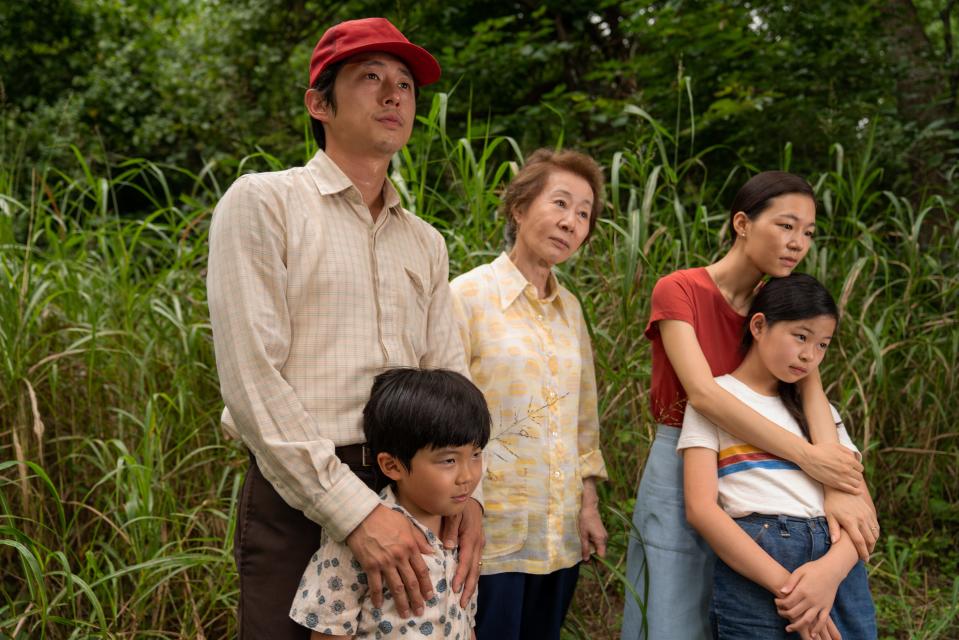Here's what an Oscar win for 'Minari' would mean for Asian Americans who feel afraid right now
- Oops!Something went wrong.Please try again later.
- Oops!Something went wrong.Please try again later.
It's a scary time for Asians in America right now.
Innocent people are dying simply for looking the way I do. My nightmares recently transformed into a more dangerous reality when eight victims, most of them of Asian descent, were shot and killed in Atlanta on Tuesday. And this isn't the first tragedy: In January, an 84-year-old Thai American man died after being brutally shoved in San Francisco, and less than two months later, a 36-year old Asian man was stabbed in New York’s Chinatown neighborhood.
Stop AAPI Hate, a group that tracks acts of discrimination and xenophobia against Asian Americans and Pacific Islanders, found nearly 3,800 incidents of hate, discrimination or attacks on Asian Americans since the start of the pandemic.
Asian Americans, including me, are beginning to wonder: What if that was me?

Anti-Asian attacks: Here's how to be an ally to the community.
Despite living here for 20 years as an American-born Korean, I felt my humanity had been stripped this year during the pandemic. Terms like the "China flu" or "Kung flu" have influenced the scapegoating of a large demographic lumped together as one, and Asian Americans became simplified as "foreigners" who brought the virus.
"Go back to China!" "Your people caused the virus!" Those are some of the comments I have received online in the past year. Even worse, I was acutely made aware of my sub-human status at times, as passerby would purposely detour around me with glares of disgust.
Our history and identity are much more complex than these harmful stereotypes and generalizations. That's the heartwarming and reassuring message of director Lee Isaac Chung's "Minari": Asian Americans are human, too.

'Minari': Here's why 'Minari' is truly an American story, even if the Golden Globes disagree
Trevor Noah on Atlanta shootings: 'If that's not racism then the word has no meaning'
"Minari" was nominated for six Academy Awards, including best picture. Even in a normal year, the film USA TODAY's film critic Brian Truitt called "funny, deep and well-acted," and the Los Angeles Times hailed as "truthful and tender" arrives in the Oscar race buttressed by a 98% fresh score on Rotten Tomatoes, with stunning visuals and artful storytelling that makes it more than qualified to win the prestigious award.
More: 'Minari' wins top honors at Sundance Film Festival
For those of us feeling dehumanized, misunderstood and afraid, this win would mean so much, even if it's not enough to combat the surge in anti-Asian racism.
The plot is simple: It's the story of a man with a dream. But within this narrative, Chung humanizes each character as viewers become invested in their three-dimensional lives. When protagonist Jacob Yi (Steven Yeun) makes the risky decision to build a new life in rural America, we get frustrated with his hubris and idealism. But at the same time we root for his success amid adversity.
Oscar nominations 2021: 'Mank' leads with 10 honors, Viola Davis makes history
"Minari" is truly storytelling at its best. Jacob is a hard-working farmer who dreams of growing Asian crops in Arkansas. Yet he's also an immigrant silently battling his internal rage and frustration. His wife, Monica (played by Yeri Han), is a quiet matriarch supporting her husband's ambition. But she's also her own person trying to navigate a major life transition in unfamiliar territory.
The way Chung depicts the Yi family is how I wish my family was seen today: as human beings with their own personal stories. When I spoke to Chung, he told me his goal in filmmaking is to "embrace the idea of being human." And I think that's especially important now. We are so much more than just Asian, yet it feels like we're seen as subordinates who "deserve" violence for the way we look.
This is America: Stop gaslighting me with the Asian 'model minority' myth
My parents left behind their comfortable lives in South Korea in hopes of finding something better here in America. This journey wasn't easy: My father, who knew little English, spent sleepless nights trying to better understand the language and earn a computer science degree. My mother was confronted with the unfortunate reality check that here in America, she would receive unwarranted stares simply for being one of the few Asians in my predominantly white neighborhood.
"Minari" successfully illustrates what it looks like to humanize Asian Americans like me. The Yi family is depicted as more than just the "model minority" or victims of racism. Chung, who based the film on his own childhood, tells the story of a family with multiple identities, coping with happiness and loss or conflict.
Simplifying families like mine as "foreign" or "infected" strips us of our humanity and minimizes us as those who don't belong. We've all worked hard to put tears and sweat into our own American Dream, only to realize that this "dream" can quickly turn into a nightmare because of anti-Asian sentiment.
Just as 2019's "Parasite" was a feat for Asians across the globe, "Minari" is a homage to Asian Americans who feel their existence is being trivialized to "spreading the virus." There's a reason we jump for joy when we see figures like Yeun making it onto the big screen: we feel seen during a time in which we're fighting for our lives. And we feel represented.
Contributing: Tami Abdollah, Trevor Hughes, Jordan Culver
This article originally appeared on USA TODAY: Atlanta shootings: 'Minari' Oscar run is symbolic for Asian Americans

